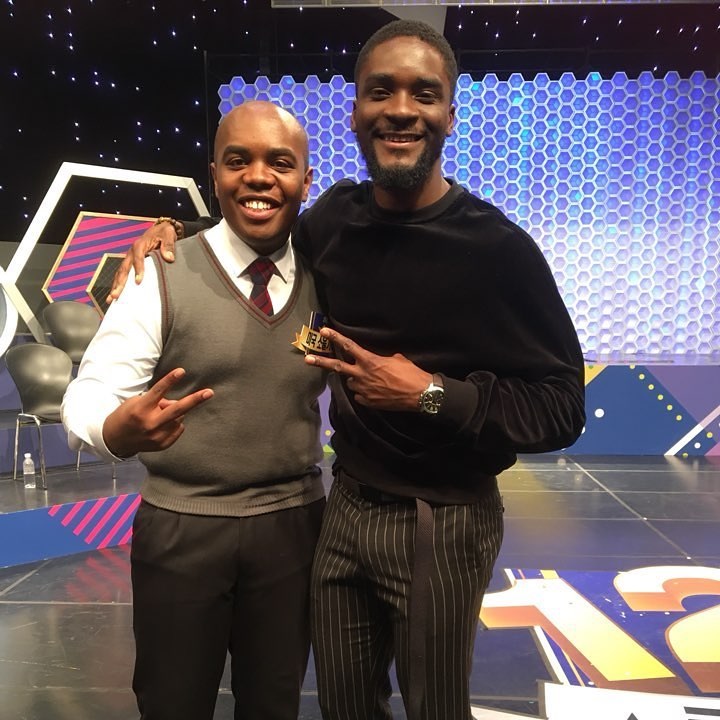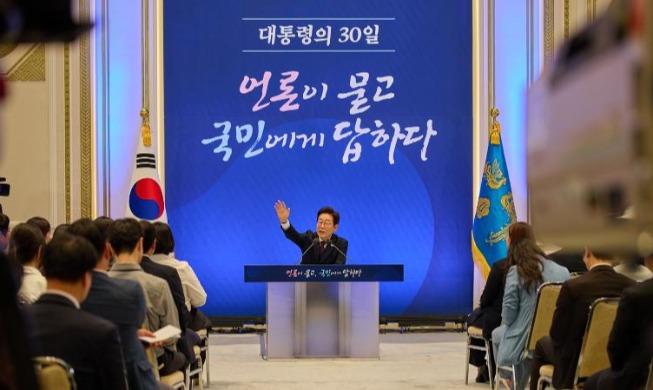- 한국어
- English
- 日本語
- 中文
- العربية
- Español
- Français
- Deutsch
- Pусский
- Tiếng Việt
- Indonesian
By Honorary Reporter Carlos Delfin from Mexico

Terris Brown with Ghanaian celebrity Sam Okyere. (Terris Brown)
Born in Brooklyn, New York, Terris Brown is seeing growing popularity in Korea's entertainment sector. Passionate about music and languages, he fell in love with the Korean language and ended up moving to Korea, where he has lived for almost nine years. More recently, he is pursuing an acting career and has appeared in TV commercials, dramas and movies.
In this interview, Brown opens up about living in Korea, opportunities for foreign nationals in Korean entertainment, and his dreams and goals.
Why did you decide to learn Korean and how did you get fluent in it?
After meeting Korean exchange students at my university, I quickly became curious about the Korean language and culture. I'd also recently switched my college major to linguistics and decided to learn Korean to better communicate with my friends. After a year of studying Korean at my university, I decided to study abroad and went to Korea for the first time. I immediately fell in love with the country and was determined to get fluent in the language. So much so that when I returned to the U.S. to complete my degree, I applied to graduate school at the University of Hawaii-Manoa because of its famous Korean Flagship Program. Thankfully I got in, and it really took my Korean to the next level.
All of my classes were in Korean, and I had to write my thesis in Korean as well. It was super tough, but it definitely helped me to talk in Korean on an academic level. Now living in Korea, I use Korean every day for work, but still occasionally have my off days. The learning never stops, so for all learners of Korea out there, don't give up.
How difficult has it been to adapt to Korean society? What is the hardest part about it?
I used to travel with my family a lot as a child, so I think I've had a pretty easy time adjusting to life here. I think that once you get a good enough hang of the language, everything else comes naturally. I think the hardest thing to adapt to was the hierarchy built into the culture. It was tough to know when to switch my speech depending on whom I was talking to, so I might've been accidentally rude to certain people when I was still a beginner. Koreans tend to be nice and helpful, so I think that if you're having a tough time adjusting to something, just asking a neighbor can help a lot.
What do you miss most about the U.S.?
I miss my family, friends and my family's cooking the most. My mother's side of the family is from Trinidad and Tobago, and it's really hard to find Caribbean food and ingredients here in Korea. So I often wish I could teleport home for a meal.
What job do you have now?
Right now, I mainly do radio or TV work, but COVID-19 has slowed things down a bit. When I'm home, I translate comics as a side job that also helps keep my Korean in shape. I've worked on various radio and TV shows, shot a car commercial, and acted in Korean dramas and movies.
What other areas do you want to venture into?
Right now, I'm really trying to focus on acting, but there aren't many roles that foreigners can play in many movies. Yet writers have been writing more roles for foreigners, so I'm studying every day and working hard. Aside from my professional work, I'm learning to play the piano on the side and would like to write my own music someday.

Jazzy Misfits (Korea Film Council)
What do you think are your greatest professional achievements in Korea?
I think that out of all the things I've done in Korea, I'm most proud of being in the movie "Jazzy Misfits." I got to play a half-Korean in the movie who doesn't speak English. My Korean had to be perfect in every scene and it was really difficult at times, but I'm so proud of myself for doing it. Our film had an early screening at the (2019) Busan International Film Festival, and I even got to walk on the red carpet. It might not seem like a big deal, but it was always something I'd wanted to do. The movie is out now, and I hope the general public loves it as much as I do.
What is your biggest dream?
My biggest dream right now is to become a successful actor in Korea, and who knows, maybe in Hollywood as well one day.
What message do you have for non-Koreans who want to enter Korean entertainment?
Honestly if you want to do it, go for it but it's not an easy road. As an entertainer, it's often hard to deal with the instability of an inconsistent income. There are also many foreigners who speak Korean at a high level, so (fluency in Korean) shouldn't be your selling point. Learn your craft and work really hard at it if you want to succeed. But if you do end up working here, you'll also find out just how rewarding it can be. Don't lose hope.
chaey0726@korea.kr
*This article is written by a Korea.net Honorary Reporter. Our group of Honorary Reporters are from all around the world, and they share with Korea.net their love and passion for all things Korean.
